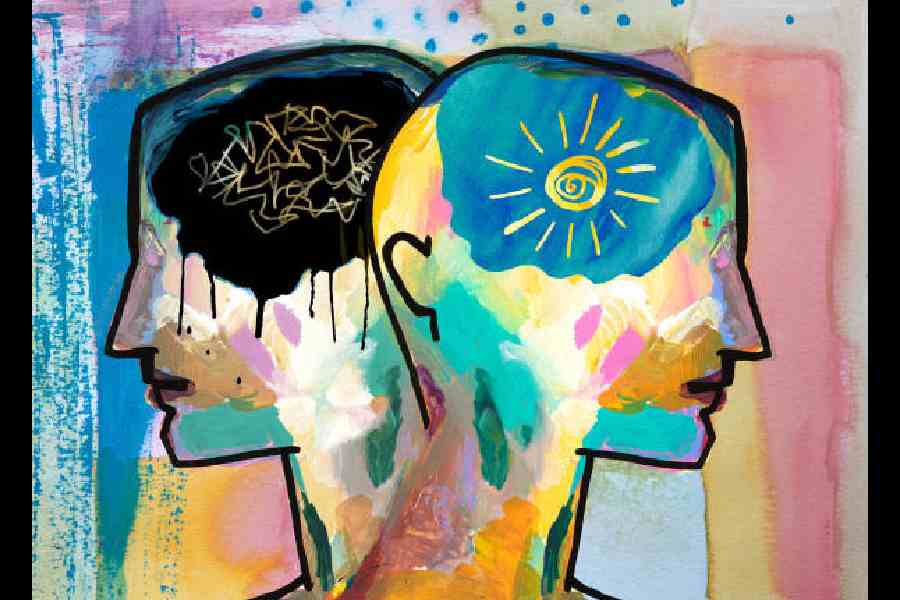I was quietly listening to Soumya, a 37-year-old teacher. He was weeping copiously and at one point asked me whether I felt he has ruined his life. I said ‘no’ but it was apparent he did not hear what I said.
Soumya had Bipolar Mood Disorder (BMD), a mental illness that changes the trajectory of life; 2-2.5 per cent of human population has BMD.
If we imagine our mood to be like a pendulum, then having BMD is like having a wonky pendulum. This pendulum swings on both sides, happy and sad. For most of us it is a gentle and calm pendulum. But for those having BMD, the swings are extreme. Sometimes, the happy side gets stuck way up high, and you feel super excited, energetic, and maybe even a little jittery. This is called a manic episode. It is like the swing is stuck at the top, and you cannot get down, even though you might want to.
Other times, the pendulum gets stuck all the way down on the sad side. You feel very down, hopeless, and have no energy. This is called a depressive episode. It is like the pendulum is stuck at the bottom, and you cannot seem to pull yourself up, no matter how hard you try. There is a marked difference between feeling sad (which is a normal emotion) and having a depressive episode.
It’s not all highor low
The important thing to remember is that having BMD does not mean you are happy or sad all the time. There can be intervening periods when you are completely stable and feel your usual self. It is about those extreme swings in mood that can be hard to control.
Persons with BMD can do completely out-of-character things when they are high or low, which they later regret after getting better. In psychiatric parlance, they lose ‘insight’ into what they are doing when they are ill. I remember a bookstore owner from north Calcutta, while travelling to Puri by road, had ordered 100 ornamental umbrellas from Pipili, Odisha. He wanted to gift it to the local hawkers. These are not typical rain umbrellas. They are primarily decorative, used for adding a splash of colour and flair to indoor and outdoor spaces. So, a fortnight later, when they arrived at his home by truck, the reality of what he had done sunk in. There are worse errors of judgment. Spending too much money, acting in an extremely rash and impulsive manner, consuming huge amounts of drugs and alcohol and even trying to jump off the roof of a tall building because you think you are Superman — can all be part of the high phase. The consequences can be grave and at times fatal.
Soumya had done something completely out of character when he was in a “high” (manic) phase. He had propositioned a young teacher, who had just joined his school. He bombarded her with lewd messages and when rebuffed, he went to her house and created a scene. The young woman was petrified and lodged a complaint. When Soumya came to see me, he was suspended from school. It was in this context, he asked me whether I felt he had ruined his life.
Highs, lows and intervening periods
Having BMD changes the course of your life and the story of Afreen remains imprinted in my mind.
I first met her when she was about 17 years old. She was rescued from a brothel in Mumbai and was staying in a children’s home on the outskirts of Calcutta for about 10-12 days. The care home staff had sent her to see me because she was unusually loud and boisterous, disruptive and disinhibited. The care home staff had bare minimum details about her as she was living with them for only 12 days. Diagnosing someone with any mental illness in such situations has many pitfalls. There were no reliable informants who can give a detailed history with which I could compare her present state. I gave her medicine to help her to sleep and calm down. After two weeks, the staff brought her for a review. She was a lot calmer and I stopped the medicines, assuming it was the sudden change in her life which had caused an unmanageable emotional upheaval.
I did not hear from her again for the next three months. The care home managers again contacted me, noticing a gradual change in Afreen’s behaviour. She had become extremely quiet and withdrawn over the past month. She had attempted to drown herself in the pond near the home and it was then her supervisor called me.
When I saw Afreen on the second occasion, she was more communicative and reflective. She was a totally different person. I could piece together the events of her life. Her life’s story, until then, laid bare the great tragedy of untreated mental illness.
Afreen was the third daughter in a family of daily wage earners in Malda. When she was 14 years old, she developed a crush for a boy and became quite vocal about liking him. She was rebuked by her parents as this kind of behaviour was not socially acceptable. Instead of changing her behaviour, she became more abusive, defiant, and started opposing the sanctions imposed on her. Her father hit her in exasperation and that night, she ran away from home to look for the boy whom she liked. From there, a saga, all too familiar for persons who work with child trafficking, unfolded. She could not locate the boy whom she liked and took shelter in a bus stop. She was befriended by a stranger who promised her a job in Calcutta.
Until then, she had never travelled outside her town of residence. She was drugged, then raped and sold off to pimps and finally was imprisoned in a brothel in Mumbai. She got infected with HIV, before being finally rescued during a police raid.
As she was recovering from her depressive phase, Afreen could clearly narrate her mental state fluctuations over the past three-four years. Tracking her mental state in chronological order (it is likened to an archaeological exploration), I realised that when she had run away from home, with an overconfidence of meeting her crush, she was ill. She was experiencing a manic episode. Her overconfidence was completely out of character, which is typical of a “high” phase. She clearly described three different states of mind — highs, lows and intervening periods of feeling her usual calm self.
Educate about mental illness
In my job, I cannot and should not feel too much and get affected by it. It can cloud my judgment. But Afreen will never leave me. The sadness I felt for her was profound. If only she was born with more privileges, in an environment where mental illnesses were detected early and treated effectively, we would not have met under such tragic situations. In a country where there were more resources and awareness about mental health, she probably would not have slipped through the net.
But Afreen lived on a planet which was far removed from the one the likes of Selena Gomez inhabit. For the uninitiated, Selena Gomez is a multi-talented American singer, actress, businesswoman, and producer. She has 430 million followers on Instagram. A documentary on her bipolar illness, My Mind & Me (on Apple TV+) is a heart-tugging and brave account of her journey. For those who are interested in the subject of sensitive, biographical portrayals of mental illness, it is a must-watch.
We live in a “developing” country. About 85 per cent people with mental illnesses in India cannot access proper treatment. There are numerous impediments. One of them is ignorance. The fact that many inexplicable behaviours can be due to mental illness, which is easily treatable, is not known to the vast majority of our population.
What can be done? Educate, educate, educate about mental illness. That is all. Approximately, one in seven of us will suffer from a mental illness at some point in our lives. Mental illnesses, like many other illnesses, affect families. Think about Afreen’s parents and Soumya’s son and his wife. So, the circle of people afflicted actually is much bigger. It is not only about you and me. It is about us.
The irony of bipolar illness is that it responds so wonderfully to medicines but left untreated, it can decimate the person.
After listening to Soumya for a while, I reiterated to him what I believe. He has not ruined himself. He has stumbled and fallen but it is not the end. There is life after this, and we will join forces to win the battle.
Dr Jai Ranjan Ram is a senior consultant psychiatrist and co- founder of Mental Health Foundation (www.mhfkolkata.com). Find him on Facebook @Jai R Ram and on Instagram @ jai_psychiatrist










